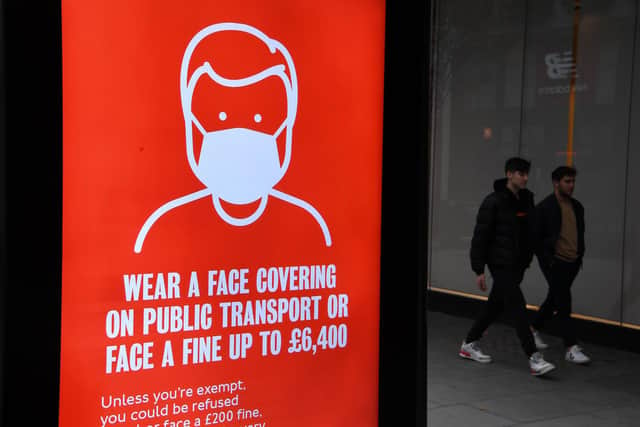Covid laws: MPs vote to extend emergency powers for further six months
and live on Freeview channel 276
MPs have voted to extend emergency coronavirus legislation for another six months.
The Coronavirus Act 2020, which came into force last March at the beginning of the pandemic, was passed by a majority of 408.
Advertisement
Hide AdAdvertisement
Hide AdThis was despite opposition from some Tory MPs, who voted against the measures branding them as “out of step” with Boris Johnson’s roadmap out of lockdown.


Health Secretary Matt Hancock had called to renew the “essential” emergency powers to deal with the pandemic as England’s restrictions gradually ease.
He said the legislation would only stay in place for “as long as necessary”.
The powers, which MPs voted by 484 to 76 to extend until the end of September, allow the government to use wide-ranging rules to stop the spread of the virus.
Advertisement
Hide AdAdvertisement
Hide AdThere was also a vote on the lockdown roadmap and the continuation of virtual proceedings in the Commons.
‘Draconian powers’
Mr Hancock called the emergency legislation a “crucial part” of the government’s Covid response as he opened Thursday’s debate.
But he acknowledged that some MPs were concerned about the powers within the Act.
"Although this Act remains essential and there are elements of it which we are seeking the renewal of, we have always said we will only retain powers as long as they are necessary,” he said.
Advertisement
Hide AdAdvertisement
Hide AdSenior Conservative MP, Charles Walker, said he did not believe that this would be the government’s last request for an extension to the powers and it would happen again in six months.
He said: "It is inevitable and anyone who thinks it's not inevitable is deluding themselves."
Sir Graham Bracy, chairman of the influential backbench 1922 Committee, said: “The danger is the Government starts to believe that these fundamental civil liberties belong to ministers to grant to us or withhold.”
Mark Harper, the former chief whip who chairs the lockdown-sceptic Covid Recovery Group, said he was opposed to the Act’s “very significant draconian powers” being extended for a further six months.
Advertisement
Hide AdAdvertisement
Hide AdMr Hancock admitted he could not guarantee the six-month extension to the Act would be the last time MPs were asked to approve the continuation of the powers introduced when the pandemic hit.
“My preference would be yes, but given the last year, I think a prediction would be hasty,” he said.
Ahead of the vote, Mr Johnson defended the Government’s approach: “The libertarian in me is also trying to protect people’s fundamental right to life and their ability to live their lives normally.
“And the only way really to restore that for everybody is for us to beat the disease and the best path to freedom is down the cautious but irreversible road map that we’ve set out – that’s what the freedom lover wants.”
Concern over vaccine passports
Advertisement
Hide AdAdvertisement
Hide AdThe unease of some Tory MPs has been heightened by speculation around the introduction of Covid status certificates, with hospitality industry figures also concerned about the implications.
The boss of the Shepherd Neame brewery and pub chain said that making jabs mandatory for entry to pubs is a “fairly poorly thought-out idea”, as trade bodies suggested the idea was “simply unworkable”.
Mr Johnson insisted “no decisions have been taken at all”, saying that there will be an update on the review into their possible use on either April 5 or 12, and said that “whatever happens” the April 12 reopening of pub gardens will be unaffected.
The Prime Minister said that “I do think there is going to be a role for certification”, though it is possible this will be limited to foreign travel.
Advertisement
Hide AdAdvertisement
Hide Ad“There are three basic components. There’s the vaccine, there’s your immunity you might have had after you’ve had Covid and there’s testing – they are three things that could work together,” Mr Johnson said.
But he acknowledged there are “moral complexities” and problems that must be addressed, raising concerns that pregnant women and those with medical reasons cannot be vaccinated.
“You might only be able to implement a thoroughgoing vaccination passport scheme, even if you wanted such a thing, in the context of when absolutely everybody had been offered a vaccine,” Mr Johnson added.
Additional reporting by PA.